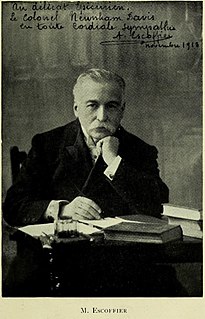Top 1200 Preferred Stock Quotes & Sayings - Page 2
Explore popular Preferred Stock quotes.
Last updated on April 16, 2025.
If you are the kind of person who makes homemade chicken stock on the regular and keeps it frozen in various sized containers for all your cooking needs, I truly commend you. Quality homemade stock will invariably add great depth of flavor and body to a recipe. But it's a luxury, not a necessity - it gilds the lily, as they say.
From our earliest days in Liverpool, George and I on the one hand and Paul on the other had different musical tastes. Paul preferred 'pop type' music and we preferred what is now called 'underground'. This may have led to arguments, particularly between Paul and George, but the contrast in tastes, I'm sure, did more good than harm, musically speaking, and contributed to our success.
One of the ironies of the stock market is the emphasis on activity. Brokers, using terms such as 'marketability' and 'liquidity,' sing the praises of companies with high share turnover... but investors should understand that what is good for the croupier is not good for the customer. A hyperactive stock market is the pick pocket of enterprise.
I love the Knicks and Rangers, right, but you still have a responsibility to your shareholders. They're not there because they're fans. You don't invest hundreds of millions of dollars in a stock because you're a fan. You do it because you think that the business is going to increase in value, that the stock price is going to go up.
In college I started studying the stock market. I went down to the stock exchange, watched all the activity from the visitors' gallery, people running around, calling numbers, shouting, and all the paper flying and the bells ringing, and of course that was exciting, and it seemed to lend itself to my analytical skills.
A broker who discovers an undervalued stock does not advertise it until he has bought a large enough quantity without letting the price go up. When the brokers' connection with a stock becomes public knowledge, it is usually a sure sign of manipulation and that the broker is seeking to drive up the price.
I always had faith in the internet. I believed in it and thought it was obviously going to change the way the world worked. I really did not understand why others were selling their stock. As stock prices plunged, I just bought them, one after another, since I had the money. I guess I was rather lucky.
Treatment of the apparently whimsical fluctuations of the stock quotations as truly non stationary processes requires a model of such complexity that its practical value is likely to be limited. An additional complication, not encompassed by most stock market models, arises from the manifestation of the market as a nonzero sum game.
The interpretation of the laws is the proper and peculiar province of the courts. A constitution is, in fact, and must be regarded by the judges, as fundamental law. It therefore belongs to them to ascertain its meaning, as well as the meaning of any particular act proceeding from the legislative body. If there should happen to be an irreconcilable variance between the two, that which has the superior obligation and validity ought, of course, to be preferred; or, in other words, the Constitution ought to be preferred to the statute, the intention of the people to the intention of their agents.
The correct attitude of the security analyst toward the stock market might well be that of a man toward his wife. He shouldn't pay too much attention to what the lady says, but he can't afford to ignore it entirely. That is pretty much the position that most of us find ourselves vis-à-vis the stock market.
Nothing in finance is more fatuous and harmful, in our opinion, than the firmly established attitude of common stock investors regarding questions of corporate management. That attitude is summed up in the phrase: "If you don't like the management, sell your stock." ... The public owners seem to have abdicated all claim to control over the paid superintendents of their property.
Me? I was lost for long time. I didn’t make any friends for few years. You can say I made friends with two trees, two big trees in the middle of the school […]. I spent all my free time up in those trees. Everyone called me Tree Boy for the longest time. […]. I preferred trees to people. After that I preferred pigeons, but it was trees first.
Unfortunately, skill in evaluating the business prospects of a firm is not sufficient for successful stock trading, where the key question is whether the information about the firm is already incorporated in the price of the stock. Traders apparently lackthe skill to answer this crucial question, but they appear to be ignorant of their ignorance.
And at a relatively early age, ten or so, I invested my first share of stock. And I used to follow, look at companies and so forth. But throughout the whole period, and indeed right through my college years, while I was involved in the stock market, always interested in finance, I never thought of it as a full-time job.
There are several things that can create an alpha - stock buybacks are one. High dividend yields are another, especially nowadays because the stock market yields more than the banks and the tenure treasury. But by and large, it tends to be companies with a strong cash flow, rising sales, accelerated earnings, a profit margin expansion.
The reality is that business and investment spending are the true leading indicators of the economy and the stock market. If you want to know where the stock market is headed, forget about consumer spending and retail sales figures. Look to business spending, price inflation, interest rates, and productivity gains.
Look, rich people already have a lot of money. There's literally trillions of dollars in cash held by corporations, their stock valuations at an all-time high. They do not need a tax cut to do anything. They can invest now, if they wanted to. They don't want to, because they can make more money just by mergers and stock buybacks and stuff like that. So, this is really just sort of a travesty.
Dill was off again. Beautiful things floated around in his dreamy head. He could read two books to my one, but he preferred the magic of his own inventions. He could add and subtract faster than lightning, but he preferred his own twilight world, a world where babies slept, waiting to be gathered like morning lilies.
Trading is a small part of the work of the stock exchanges. They are really to do with financial speculation, and they speculate on the value of the yen, the dollar, the pound, the franc, or the euro, at any given time. Billions are lost and billions are made by this speculation, and that's what the stock exchanges are about. They are for greedy minds.
Nowhere does history indulge in repetitions so often or so uniformly as in Wall Street. When you read contemporary accounts of booms or panics, the one thing that strikes you most forcibly is how little either stock speculation or stock speculators today differ from yesterday. The game does not change and neither does human nature.
An index fund is a fund that simply invests in all of the stocks in a market. So, for example, an index fund might invest in every single stock or almost every single stock in the U.S. market, it might invest in every single stock abroad, or it might invest in all of the bonds that are out there. And you can make a perfectly fine investing portfolio that mixes equal parts of all three of those.
It is argued by our GDP obsessed policy planners that eventually the money being made by the stock market operators or the IT industry would trickle down to the poor farmers in terms of ancillary jobs that would be created. But the fact is, that this has not happened, despite the boom in the stock market and the IT industry.
There was no actually stock footage in "Medium Cool." I wrote the script. I wrote the riots. And I integrated the actors in the film in the park during the demonstrations. But nowhere was it like we had stock footage and then later, in editing, integrated it into the film. It was all done at the time.

























































